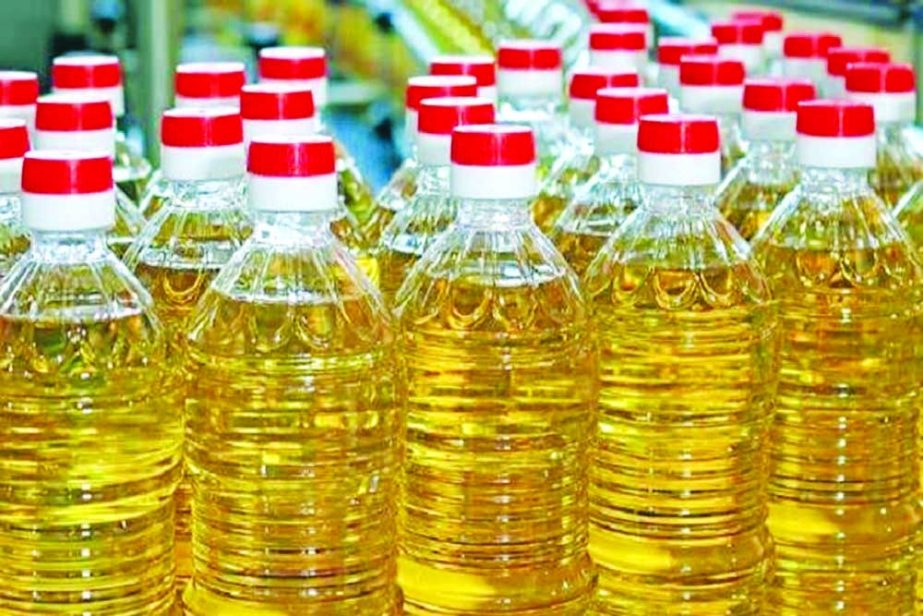
Kazi Zahidul Hasan :
Normalcy has been seemingly returning to the capital’s edible oil market after the government launched crackdown against hoarders of key cooking ingredient to end its shortage in and around the city.
Market insiders said,loose soybean oil was selling at the capital’s Moulvibazarmarket below the government fixed rate.
On Wednesday, loose soybean oil was sold at Tk 140 per litre, down by Tk three from Tk 143 per litre fixed by government.
Besides, prices of five-litre bottled soybean oil have come down by Tk 20in the last two days, according to the traders.
The National Board of Revenue (NBR) on Saturday cut value added tax (VAT) on import of edible oil to 5 per cent from 15 per cent in line with the government’s decision to rein in the runaway price for the essential cooking ingredient.
With the cut, consumers will have to pay only 5 per cent VAT in the value chain of soybean oil and palm oil, imported to meet domestic demand.
Traders said that prices of the edible oil came down in the capital following the reduction of VAT and raids conducted by the Directorate of National Consumer Rights Protection (DNCRP).
Last week, price tag of five litre bottled soybean was Tk 795, selling at Tk 790 at wholesale level. On Wednesday, it was sold at Tk 770 at wholesale level.
“Representative of edible oil companies have requested us to sell their products saying that they will go for further cut in edible oil prices in a day or two,” Md Rafiq, a trader at the city’s Moulvi Bazar market.
Besides, wholesale rates of palm oil is also witnessing a downward trend at the Moulvi bazar market.
There per litre palm oil was sold at Tk 128 to Tk 130 on Wednesday.
“The supply crunch of edible oil is becoming normal slowly as the companies started delivering their products,” said a trader.
Though wholesale prices of edible oil price dropped, its impact is yet to be seen on retail market.
“We have learnt that soybean oil prices have dropped at the wholesale market. But we are yet to get the benefit because retail prices of the cooking oil is still high. Today, I have bought per litre bottled soybean at Tk 180,” said Nur Mohammad, a private service holder who have been residing in the capital’s Mugda area.
Recently, bottled edible oil disappeared from the shelves of retail shops in the capital after the government rejected the millers bid to raise prices of bottled soybeanoil price to Tk 180 per litre from Tk 168.
Later, the oil refiners tightened supply in an ‘ill intention’ to manipulate the cooking oil price and create an artificial crisis of the commodity in the market, according to market insiders.
In wake of the situation, the government agencies started search action against edible oil hoarders.
However, the President of the Bangladesh Retail Edible Oil Traders Association, Haji Golam Moula, expressed his dissatisfaction over the ongoing raids by the government agencies at the traders’ godowns.
“We are wholesale traders and we have to store a certain quantity of edible oil to run our business. There is law how long a trader can store the essential commodities. So, the random raids is unfair,” he added.
Edible oil price has been increased by 53 per cent across the country in last two years, causing huge discontent among the consumers.
During this period, prices of the commodity was adjusted upwards several times due to increase in its price on the global market.
Despite the fact, domestic edible oil market remained highly volatility due mainly to ‘foul play’ by a syndicate of unscrupulous traders, alleged consumers rights group.
On January 6, 2020, branded cooking oil was sold for Tk 110 per litre, while it was Tk 130 per litre on January 10, 2021 whereas on February 6, 2022 its price was standing at Tk 168 per litre.
On the other hand, import cost of per metric ton soybean oil was US$718 on January 6, 2020, US$990 on January 10, 2021 and US$1440 on February 6, 2022.
The import cost of soybean oil has increased by 100.56 per cent from January 2020 to February 2022.
Since Bangladesh is a large importer of edible oil, the international factors affect domestic prices. Moreover, the taka depreciation has made imports costlier. The situation is likely to remain the same for months to come, according to importers.
Industry insiders say about 95 per cent of edible oil is imported from other countries. Among edible oil, palm oil is imported in huge quantities (1.4 million -1.6 million tonnes) as it is widely used by low-income groups, along with hotels and other eateries.
The country also imports 0.7 million to 0.8 million tonnes of soybean oil annually.
In 2019, Bangladesh imported 2.14 million tonnes of edible oils, in 2020 it imported 1.97 million tonnes of edible oil and the edible oil import stood at 2.10 million tonnes in 2021, according to the Chattogram Sea Port.

